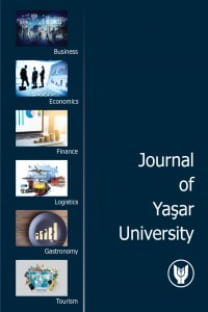GASTRONOMİ TURİZMİNE İLİŞKİN TURİST GÖRÜŞLERİNİN KÜLTÜRLER ARASI KARŞILAŞTIRILMASI
Bu çalışmada, Kapadokya Bölgesi’ne tatil amaçlı gelen turistlerin, gastronomi turizmine yönelik görüşleri ile yöresel yiyecek ve içeceklere ilişkin tutum ve davranışları kültürler arası karşılaştırılmıştır. Araştırmanın örneklemini Kapadokya Bölgesi’ne tatil için gelip konaklayan 401 yabancı turist oluşturmaktadır. Araştırma verileri, araştırmacı tarafından geliştirilen anket formu ile elde edilmiştir. Kapadokya’yı ziyaret eden turistlerin yarıdan fazlasının Asya ülkelerinden geldikleri; Amerika kıtasından gelenler için, tatil yerini seçmede mutfak kültürünün diğer kıtalardan gelenlere göre daha önemli olduğu; Avrupa’dan gelenlerin çoğunlukla lüks restoranları veya hazır yemek restoranlarını tercih ettikleri; her üç kıtadan gelen turistlerin yöresel yiyecek ve içecekleri tatma oranlarının düşük olduğu belirlenmiştir. Anahtar Kelimeler: Gastronomi turizmi, yöresel yiyecek ve içecekler, yiyecek-içecek kültürü, Kapadokya.
Anahtar Kelimeler:
Gastronomi turizmi, yöresel yiyecek ve içecekler, yiyecek-içecek kültürü, Kapadokya
-
This study aims to specify the opinions of visitors coming to Cappadocia from different nationalities on gastronomy tourism, their behaviours and attitudes towards local food and beverages. The sample of study consists of 401 tourists from different contries visiting Cappadocia. The data of this study is obtained by a questionnaire developed by researcher. In the data analysis, absolute and percent value, mean, standard deviation and variance analysis are applied. Tukey test is used for the aim of determining which groups have caused the difference within groups in which a difference is found as a result of variance analysis. Acording to the results, it is determined that more than half of the visitors coming to Cappadocia have come from Asian countries; cuisine culture for the visitors is more significant than from another continents in choosing holiday destination; the visitors coming from Europe prefer mostly luxury or fast food restaurants; the rate of tasting local food and beverages for visitors from each one of the three continents is low
___
- Ab Karim, M. S. (2006). “Culinary Tourism as a Destination Attraction: An Empirical Examination of the Destination‟s Food Image and Information Sources, Degree Doctor of Philosophy, Oklahoma State University.
- Albayrak, A. (2013). “Farklı Milletlerden Turistlerin Türk Mutfağına İlişkin Görüşlerinin Saptanması Üzerine Bir Çalışma”, Journal of Yasar University, Vol. 3, No.8, 5049-5063.
- Altunışık, R., Coşkun, R., Bayraktaroğlu, S. ve Yıldırım, E. (2012) Sosyal Bilimlerde Araştırma Yöntemleri, Sakarya Yayıncılık, Sakarya.
- Aslan, Z. Güneren, E., Çoban, G. (2014). “Destinasyon Markalaşma Sürecinde Yöresel Mutfağın Rolü: Nevşehir Örneği”, Journal of Tourism and Gastronomy Studies, Vol. 2, No.4, 3-13.
- Bekar, A. ve Kılıç, B., Şahin, Ö. (2011). “Gastro Turizm ve Turistik Tüketicilerin Gastro Turizme Yönelik Görüşleri”,12. Ulusal Turizm Kongresi: 516-524. Akçakoca.
- Brokaj, M. (2014). “The Impact of the Gastronomic Offer in Choosing Tourism Destination: The Case of Albania”, Academic Journal of Interdisciplinary Studies, MCSER Publishing, Rome-Italy Vol.3, No. 2
- Bucak, T. ve Aracı Ü. E. (2013). “Türkiye‟de Gastronomi Turizmi Üzerine Genel Bir Değerlendirme”, Balıkesir Üniversitesi Sosyal Bilimler Enstitüsü Dergisi, Cilt 16, Sayı: 30,213-217
- Cronbach, U. (1990). Essentials of Psychological Testing. Fifth Ed., New York: HarperCollins.
- Dilsiz, B. (2010). “Türkiye‟de Gastronomi ve Turizm: İstanbul Örneği”, Yayınlanmamış Yüksek Lisans Tezi, İstanbul Üniversitesi Sosyal Bilimler Enstitüsü, İstanbul.
- du Rand, G. E. (2006). “The Role of Local Food in Destination Marketing, A South African Situational Analysis, Degree Doctor of Philosophy, University of Pretoria, Department of Tourism Management.
- du Rand, G.E., Heath E. (2008). “Towards a Framework for Food Tourism as an Element of Destination Marketing”, Current Issues in Tourism, Vol. 9, No. 3, 206-234.
- Gökdemir, A. (2009). Mutfak Hizmetleri Yönetimi, Detay Yayıncılık, Ankara.
- Hall. M. C. ve Sharples, L. (2003). “The Consumption of Experiences or The Experiences of Consumption? An Introduction to The Tourism of Taste”, Food Tourism Around the World içinde (ed.: M.C. Hall, L. Sharples, R. Mitchell, N. Macionis ve B. Cambourne). Burlington. Elsevier Butterworth‐Heinemann.
- Kesici, M. (2012). “Kırsal Turizme Olan Talepte Yöresel Yiyecek Ve İçecek Kültürünün Rolü”, KMÜ Sosyal ve Ekonomı k Araştırmalar Dergı s , C lt 14, Sayı 23, 33-37.
- Kılıç, B ve Bekar, A. (2012). “Turistlerin Gelir Düzeylerine Göre Destinasyondaki Gastronomi Turizmi Etkinliklerine Katılımları”, 2. Kırsal Turizm Sempozyumu, Aksaray.
- Kivela, J., Crotts J. C. (2005). “Gastronomy Tourism: A Meaningful Travel Market Segment”, Journal of Culinary Science & Technology, Vol. 4, No .2/3.
- Montanan, A. ve Staniscia, B. (2009). “Culinary Tourism As a Tool for Regional Re-equilibrium”, Abingdon: European Planning Studies, Vol. 17, Iss. 10, pg. 1463
- Pullphothong L., Sopha, C. (2013). Gastronomıc Tourısm in Ayutthaya, Thailand.Proceedings of the International Conference on Tourism, Transport, and Logistics, 14-16 February, Holiday Inn Paris-Gare de L‟Est, Paris, tarihi: 15.012.2014) Erişim
- Punch, K. (2005). “Introduction to Social Research – Quantitive and Qualitive Approach”, Second Ed,. Sage Publications Inc., California.
- Sekaran, U. (2000). “Research Methods for Business: A Skill-Building Approach”, Third Edi., New York: John Wiley & Sons, Inc.
- Shenoy, S.S. (2005). “Food Tourism and Culinary Tourist”, Degree Doctor of Philosophy, Clemson University, (http://www.hehd. clemson.edu/ PRTM/TRMcenter/shrimp/Shenoy2005draft.pdf. Erişim Tarihi: 08.07.2014)
- Talas, M. (2006). “Tarihî Süreçte Türk Beslenme Kültürü ve Mehmet Eröz‟e Göre Türk yemekleri”, Türkiyat Araştırmaları Dergisi, Sayı:18, 273-283.
- Torres, R. (2002). “Toward a Better Understanding of the Tourist and Agricultural Linkages in the Yucatan: Tourist food consumption and preferences”, Tourism Geographie, Vol. 4, No. 3, 282-306.
- http://www.nevsehir.gov.tr/(Erişim Tarihi:15.05.2014 Saat:19:23).
- ISSN: 1305-970X
- Başlangıç: 2006
- Yayıncı: Yaşar Üniversitesi
Sayıdaki Diğer Makaleler
Televizyon Haberlerinde Garbiyatçılık: TRT Örneği
Psikolojik Güçlendirme Çalışanların Sosyal Kaytarma Davranışlarını Azaltır mı?
GASTRONOMİ TURİZMİNE İLİŞKİN TURİST GÖRÜŞLERİNİN KÜLTÜRLER ARASI KARŞILAŞTIRILMASI
Erkek Dergilerini Anlamak: GQ Türkiye Örneğinde Bir Alımlama Çözümlemesi
